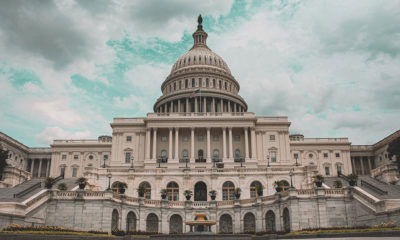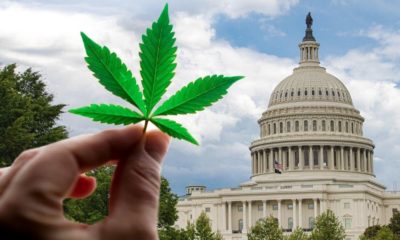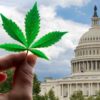
Politics
AG Sessions to Congress: Let Me Prosecute Cannabis Patients
A recently revealed memo from AG Jeff Sessions urging Congress to overturn restrictions on DOJ prosecution of state-legal medical cannabis operations is heating up already simmering uncertainty surrounding the nascent cannabis industry.
Like his boss Donald Trump, Attorney General Jeff Sessions is making headlines by making bombastic statements. But beyond the noise, Sessions has yet to accomplish much during his first few months in office.
For instance, he has yet to follow through with any of his many vague-yet-ominous threats to crack down on the country’s burgeoning legal marijuana industry. The main reason why is that Sessions — even if he had enough DEA agents (he does not) and even if he were to fill many of his vacant federal prosecutor positions (he has not) — can’t do anything about it.
The Justice Department is legally barred from prosecuting medical cannabis, as long as state law is obeyed. And Sessions knows it, which is why — as MassRoots’s Tom Angell reported — Sessions lobbied Congress to have those protections removed:
At @MassRoots I obtained a Jeff Sessions letter asking Congress not to extend state medical marijuana protections.https://t.co/OM8pZt8UAf pic.twitter.com/j4qDWaHYSz
— Tom Angell 🌳📰 (@tomangell) June 12, 2017
Since 2014, Congress has approved annual spending bills that included an amendment prohibiting the U.S. Justice Department from prosecuting medical-marijuana operations that obey state law. Named after its bipartisan sponsors, the Rohrabacher-Blumenauer amendment (often referred to as a “budget rider”) was included in the temporary spending bill passed May 5, which funds the federal government until the fall.
The rider was never popular with prosecutors, and Obama’s Justice Department challenged it when it was first passed — and lost at the Ninth Circuit Court of Appeals, which ruled that lower courts had to find that a medical cannabis operation was breaking local law before a federal prosecution could begin.
The ruling only applies to medical cannabis — not recreational. And unless the Supreme Court rules otherwise, the Ninth Circuit’s ruling only applies to states within its jurisdiction, which includes California, Oregon, Washington and Nevada, where recreational marijuana is legal.
Obama also pressured Congress, unsuccessfully, to remove the rider from the last few budget bills.
However, when Trump signed the temporary spending bill, he included a signing statement that observers say allows the executive branch to ignore the rider’s protections.
And prior to the signing, Sessions tried to convince Congress not to pass the rider.
In the letter, dated May 1, Sessions claimed that marijuana businesses is “causing harm” in the western states within the jurisdictions of the San Francisco-based Ninth Circuit Court of Appeals — the same court that on Monday delivered yet another defeat to Trump’s executive order restricting travel for citizens of certain Muslim-majority countries — are using the rider to “thwart prosecution.”
In this, Session is either mistaken or attempting to deliberately mislead federal lawmakers.
The rider only guards cannabis businesses following state law from federal prosecution.
State and local authorities are allowed to pursue prosecutions against whomever they wish, and federal authorities — including the DEA agents who have been repeatedly raiding grow operations in violation of Colorado law — can prosecute any law-breaking marijuana operation, whether or not it is “causing harm.”
Sessions is notoriously opposed to marijuana reform. At a Senate hearing last year, the former Alabama senator pined for the days of Nancy Reagan and Just Say No — back when the messaging made it clear that “good people don’t smoke marijuana.” Sessions favors mandatory minimums and pursuing low-level “easily provable” drug offenses — exactly the kind of policies responsible for America’s burgeoning prison population.
But Sessions may be hard-pressed to convince Congress to allow the DOJ to wage what would be a vastly unpopular war on medical marijuana: More than 90 percent of Americans support medical marijuana, according to polling, and some of the country’s most conservative members of Congress have proved to be pro-cannabis in some capacity.
Sessions’s political prestige is also severely diminished. Last week, it was reported that the attorney general offered to quit his post, in response to Trump’s anger over Sessions recusing himself from the investigation into the contacts between Trump’s presidential campaign and Russian officials. Sessions, an early Trump supporter, had at least one meeting with top-level Russian officials that he neglected to mention during his Senate confirmation hearings in January.
TELL US, does the revelation of this memo change your stance on AG Sessions?

























